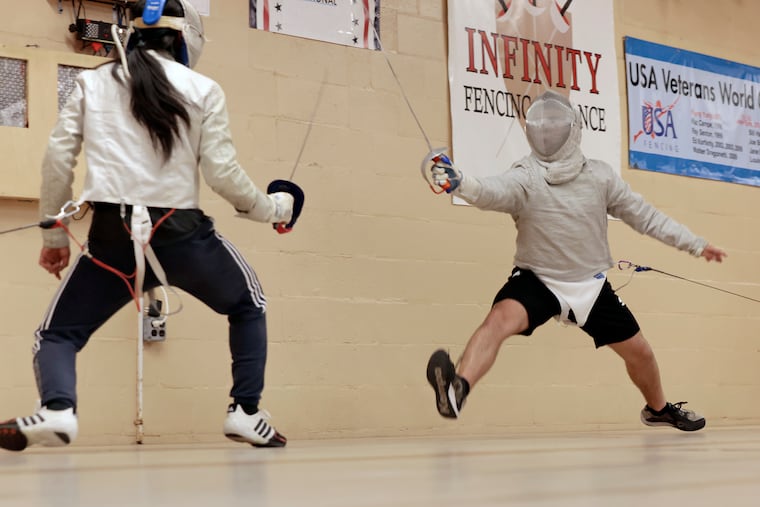South Jersey fencing club teaches sabre rattling, confers confidence
Owner Jane Eyre - yes, that's right - went from egg-handling farm girl to champion fencer teaching the basics of swordplay in Gloucester County.

Again and again, the two fencing students would thrust and parry, the swift sabre touches to their bodies registering on the electrically conductive jacket — known as a lamé — that each one wore to keep score of accumulated points.
“Once more,” a coach commanded the pair, standing on a roughly 5-foot-by-14-foot strip of floor that served as the field of battle. The combatants obliged, the metallic rattling of clashing weapons resonating throughout the room at Infinity Fencing Alliance in Woolwich, Gloucester County, one of just two fencing clubs in South Jersey.
Built in 1880, the squat structure was once used to sell chickens and eggs by the family of the current owner, Jane Eyre. (She’s quick to say that her surname belonged to a former husband, and that her parents didn’t name her after the 1847 novel by Charlotte Brontë.)
Pressed into service as an egg processor from time to time, Eyre, 69, who’s been an artist and a children’s book illustrator, cast about for something to do after her son, Josh Tartaglione, now 44 and a Seattle psychiatrist, “was grown.”
She decided to remake her life in middle age.
Eyre first picked up a sabre at 44, then became a legend in the world of veteran fencing (age 40 and over), winning more than 50 gold medals at national and international championship competitions, and carving a path to the USA Fencing Hall of Fame.
Eyre has been coaching fencing for more than 20 years. She founded Infinity in 2012, teaching combat sport — Eyre calls it “physical chess” — to around 50 students, many of whom are children and teenagers. Her partner, Wang Yung, 72, coaches with her. He’s one of just 100 fencing masters in the United States, the highest certified level in fencing.
The coaching has gone well: Three Infinity members have qualified for the USA Fencing National Championships this year in Phoenix, starting next Friday and running through July 9.
Beyond accumulating competition accolades, “kids fence to help get into colleges,” Eyre said. Several elite schools offer fencing programs, including Princeton University and the University of Pennsylvania. Many other schools have fencing clubs.
For some young people, fencing is simply preferable to team sports.
“I’ve played soccer, baseball, and basketball,” said Infinity athlete Jason Ahlman, 17, of Woolwich, a rising senior at Kingsway Regional High School in Woolwich. “They all gave me horrible anxiety. In soccer, if I ever got the ball, I just quickly passed it.”
Ahlman, who’s also qualified for the Phoenix nationals, said his fear was hurting the team with poor play.
“But in an individual sport like fencing, I don’t worry about letting other people down. It’s just me. And the longest a bout goes is eight minutes.”
Michael Liguori, 16, of Washington Township, and a rising junior at Gloucester County Institute of Technology in Sewell, is enamored of the sport’s combination of concentration and speed.
“You’re constantly making a bunch of split-second decisions as you go along,” he said. A kind of paradox develops, he said: “You have to think so much, but there’s no time for thinking.”
What appeals to Infinity fencing parents such as Jen Sedlock, 46, of Woolwich, is that, despite the swordplay and swift action reminiscent of movies that depict bloodshed, fencing is relatively safe for people such as her 13-year-old son, Tyler.
“I was never concerned about injuries,” said Sedlock, an instructional designer at Rowan University in Glassboro who shows teachers how to teach online courses.
Soccer registers 32% injury rates, basketball 13%, medical studies show. Fencing has a 3% injury rate.
None of the three kinds of fencing swords (sabres, foils, and épées) have sharp edges or points. Fencers typically wear a hard chest protector, an underarm, long-sleeved jacket, knickers (or pants), masks, and, in many cases, a lamé.
Fencing, long considered an elite sport, can be expensive. But, Sedlock said, “You have to put money into any sport your kid plays.”
Infinity offers group classes in four-week blocks for a total of $155, for one class per week. Private lessons with Wang are $60 for members.
In some cases, parents have been known to spend as much as $100,000 for lessons, equipment, private coaches, camp, and travel.
But the opportunity to have their kids participate in an engaging sport isn’t the only reason some parents are willing to bear potentially high costs.
Parents know that fencing can be appealing to children with ADHD (attention-deficit hyperactivity disorder), Eyre said: “They want something to happen quick. In sabre, you win fast and lose fast.”
Pediatricians say fencing helps children with ADHD learn to focus, pay attention, and to develop decision-making abilities. Because fencing is an individual sport, the fencer is solely responsible for their success or failure, which becomes a great lesson in responsibility.
“Fencing is so all-encompassing, using body and mind, there isn’t much in the way of distractions,” said Ian Burgess-Linden, 26, a structural engineer and part-time Infinity coach who will be fencing in the Phoenix championships. “It keeps the interest of children with ADHD. It also has clear rules and goals, which also helps.”
On a recent night, people at Infinity took turns petting Jo Jo, the shih tzu-poodle everyone calls the fencers’ emotional support dog.
Though Jo Jo confers comfort, ultimately it’s fencing itself that helps young people feel better about themselves.
“My whole life, I didn’t fit in. I felt like an outsider,” Liguori said.
“But with fencing, I do fit. And it’s taught me how to carry myself. And to be confident.”